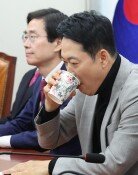Unity to stand up to N. Korea
Unity to stand up to N. Korea
Posted December. 21, 2010 11:08,
South Koreas firing drill in waters near Yeonpyeong Island Monday showed Seouls will to safeguard its five islands in the Yellow Sea and territorial waters to the country and the world. The exercise also confirmed the Souths determination that it will tolerate no provocation by North Korea. Pyongyangs Nov. 23 attack on Yeonpyeong attracted global focus to a routine drill in South Korean waters below the Northern Limited Line in the Yellow Sea. Though the drill was completed without hitch, Seouls military should remain vigilant since Pyongyang will likely launch another provocation.
The South Korean military fired to the south and west of Yeonpyeong with self-propelled K-9 artillery, 105-millimeter towed guns, Vulcan cannons, and 60- and 81-millimeter mortar shells. The South announced that it would conduct a firing drill between Saturday and Tuesday and informed the U.S., Japan, China and Russia of this. The exercise was a regular drill but Seoul gave notice of it to neighboring countries and prepared for the drill to prevent rash action by Pyongyang.
The North made extreme statements such as the firing drill will lead to nuclear war, using all of its propaganda channels. It is doubtful whether Pyongyang has a nuclear weapon that can be carried by missiles, and the North is going toward a path that will doom the Kim Jong Il government. The drill, however, blocked the Norths scheme to nullify the inter-Korean sea border by threatening nuclear war.
The North attacked Yeonpyeong by nitpicking a regular drill to safeguard the nation by military forces. New South Korean Defense Minister Kim Kwan-jin has said several times that if the North provokes again, the South will retaliate by exercising its right to self-defense until the root of the enemy threat is removed. South Korean President Lee Myung-bak also promised his people enormous punishment for the North. If Pyongyang provokes again, Seoul must root out the origin of the provocation so that the same mistake is not repeated.
Outgoing New Mexico Gov. Bill Richardson, who visited the North at the time of the Yeonpyeong drill, was told by Pyongyang that it will allow U.N. nuclear inspectors back to the North. The North expelled inspectors of the International Atomic Energy Agency in April last year, repeating the expulsion and return of such inspectors at will. Only a month after it kicked out inspectors last year, Pyongyang conducted a second nuclear test. After achieving nuclear development to a desired degree, the North will likely play with inspectors again to ease global vigilance and encourage confusion in the South. Seoul made the right response in saying, The return of inspectors to selected areas that North Korea wants to show is meaningless. The North probably wants to use the inspections to argue that it uses nukes in a peaceful way.
In an emergency meeting of the U.N. Security Council Sunday, Russia failed to mention the Norths attack on Yeonpyeong but requested both Koreas to refrain from action. While Moscow remained silent when Pyongyang shelled the island, Russia urged emergency talks at the Security Council by picking South Koera`s firing drill for no reason. Other Security Council members agreed to include criticism of the Norths shelling of Yeonpyeong by persuading Russia. China, however, was the lone country out of 15 council members to support the North, preventing a conclusion in the meeting.
Seoul must not be swayed by Pyongyangs multifaceted offensives and Beijing and Moscows siding with the North. In times like this, South Korea should unite. President Lee said, North Korea aims at us when we are divided, adding, Tight security is not just backed by strong military power. The tightest security comes from the unity of the people. South Korea is forty times bigger than North Korea in national power. If a nation is divided, its national security is at risk no matter how strong its economy and military are.
The leader of the main opposition Democratic Party, Sohn Hak-kyu, expressed opposition to the drill. He warned of damage to soldiers and civilians in life and assets, but giving up an exercise upholding the countrys right to self-defense is akin to giving in to the Norths threats. The North struck the South by sinking the naval vessel Cheonan and again by attacking Yeonpyeong. Had Seoul nixed the drill because of pressure from Pyongyang, Beijing and Moscow, this would have only boosted the Norths morale and led to another provocation.
In case of a national security crisis, politicians should put aside their interests and speak with one voice to alleviate the peoples fears. The chairman of the minor conservative Liberty Forward Party, Lee Hoi-chang, said the right thing when he criticized Sohn for cowardly defeatism. Winston Churchill, who became U.K. prime minister after the Second World War began, expressed his determination in his first parliamentary speech by saying, "I have nothing to offer but blood, toil, tears, and sweat." The leaders of both the South Korean ruling and opposition parties are hoped to think of what they can offer to the nation if the North conducts another provocation.







